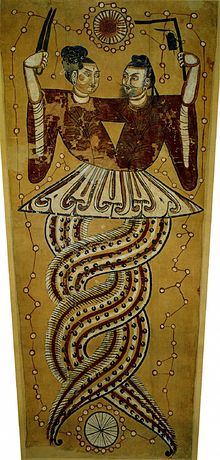| Fuxi | |||||||||||||||||||
|---|---|---|---|---|---|---|---|---|---|---|---|---|---|---|---|---|---|---|---|
 Fuxi and Nüwa. Hanging scroll. Color on silk. Located at the Chinese History Museum. | |||||||||||||||||||
| Chinese | 伏羲 | ||||||||||||||||||
| |||||||||||||||||||
| Part of a series on |
| Chinese folk religion |
|---|
 |
Fuxi or Fu Hsi (伏羲)[a][1] is a culture hero in Chinese mythology, credited along with his sister and wife Nüwa with creating humanity and the invention of music,[2] hunting, fishing, domestication,[3] and cooking, as well as the Cangjie system of writing Chinese characters around 2900 BC[4] or 2000 BC. Fuxi was counted as the first mythical emperor of China, "a divine being with a serpent's body" who was miraculously born,[5] a Taoist deity, and/or a member of the Three Sovereigns at the beginning of the Chinese dynastic period.
Some representations show him as a human with snake-like characteristics, "a leaf-wreathed head growing out of a mountain", "or as a man clothed with animal skins."[5]
Cite error: There are <ref group=lower-alpha> tags or {{efn}} templates on this page, but the references will not show without a {{reflist|group=lower-alpha}} template or {{notelist}} template (see the help page).
- ^ Theobald, Ulrich. Fu Xi 伏羲 ChinaKnowledge.de - An Encyclopaedia on Chinese History, Literature and Art
- ^ Fernald, Helen E. (December 1926). "Ancient Chinese Musical Instruments: As Depicted on Some of the Early Monuments in the Museum". The Museum Journal. XVII (4): 325–371.
- ^ Ivanhoe, Philip J.; Van Norden, Bryan W. (2005). Readings in Classical Chinese Philosophy (2nd ed.). Indianapolis: Hackett Publishing Company. p. 379. ISBN 0-87220-781-1. OCLC 60826646.
- ^ Canton, James; Cleary, Helen; Kramer, Ann; Laxby, Robin; Loxley, Diana; Ripley, Esther; Todd, Megan; Shaghar, Hila; Valente, Alex (2016). Canton, James (ed.). The Literature Book. New York: DK. p. 21. ISBN 978-1-4654-2988-9.
- ^ a b Pletcher, Kenneth. "Fu Xi". Encyclopedia Britannica. Retrieved 2023-05-30.
